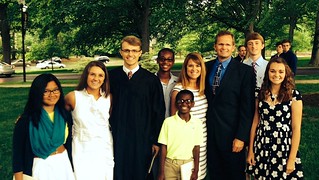The incoming vice president of NAMB’s newly-formed Send Relief mercy and compassion ministry shares how service has been an integral part of his life and testimony.
Send Relief: Tell us a bit about your testimony.
David Melber: I’m a native of Paducah, Ky., and I was raised by Christian parents. We were very active in service-related projects, and that shaped the time leading up to me accepting the Lord. I can remember as a young teenager thinking, “I don’t really understand why we’re devoting all of this time or effort or resources to this.” But that was my parents’ Christian witness to me that finally led me to the point that I realized there was something about their lives that I did not share, and I came to know the Lord as a teenager.
SR: How did you come to be involved in full-time ministry?
DM: After accepting Christ, I stagnated in discipleship. I went through college, met my wife, Tera, got married and moved onto a path that led to success in the business world. I was pretty much convinced that the Lord had allowed us to be in a role where we could make a lot of money and give money away. I thought that was how He would have us serve.
I traveled an enormous amount of time with my job, and Tera and a group of ladies started praying for me. They were praying that I would be home with my family more often.
Through this group of ladies praying and the Lord’s conviction over a period of 18 months, God just basically said to me, “You say you trust me, but you don’t trust me with your finances. Unless you trust me with that, we can’t continue on this path.”
That initiated the sequence of leaving secular work and going to seminary. While I was in seminary, the Lord gave us a heart for missions. In 1999, I joined the team at Crossings in Kentucky. Through Crossings, we were helping students realize you don’t have to wait until you’re an adult to live for the Lord. God wants you to be on mission right now, right where you are.
SR: Tell us about your family.
DM: We have six kids, and as you can see, obviously some of them are not genetically like us. Over the last 15 years, God opened our heart to adoption and the orphan crisis. In addition to our three biological children, we have a daughter from the Philippines and two sons from Ethiopia.
SR: How did God lead you to adopt?
DM: Growing up in Paducah, we did not personally know of anyone who had been through an international adoption, so we were walking down a path that was very much uncharted for us.
One of our very first international partners at Crossings was a camp in Moldova. When I visited, I was taken into an enormous orphanage—there were probably 600 or 700 orphans in this four- or five-story concrete building. I was walking through this massive, cold orphanage, and I remember thinking, “This is not acceptable.”
We already had three kids at the time, and we knew that we were done growing our family biologically, but I remember calling Tera and just saying, “You know, the Lord has blessed us. We can’t obviously adopt all of them, but we have to do something.”
Maritess was two weeks away from her 7th birthday when we brought her home. We got Jonas when he was 5 and then Isaac when he was 4. So they did come here with memories about their upbringing. Knowing their stories has helped us see through their eyes and through the eyes of people who have grown up in vastly different circumstances from what we typically do here in the United States. It’s really softened our hearts.
A lot of people will say, “You’ve been such a blessing to bring these three kids into your home,” and I’ll say, well, the blessing for us has been far greater. It’s that ever-present reminder that God has us here to be a witness and proclaim His name and share His gospel with all of earth. It’s shaped all of our kids. It’s reshaped our whole family. It’s changed our understanding of the gospel as people that are adopted into the kingdom.
SR: What is your hope for Send Relief to mobilize all generations of the church?
DM: As you think about the population of the respective churches that we sit in, not everybody is going to say, I feel called to go plant a church. The beauty of something like Send Relief, and all the various ministries that could come out of that, is its capacity to involve everyone from an 8-year-old child to a senior adult with very tangible ways that they can be the hands and feet of Christ. We need to take our kids and involve them in serving others—even if they don’t understand the gospel yet. Part of our training and stewardship with young kids is to engage them with serving and caring for others. I didn’t have any idea that the service projects that my parents were involved with would ultimately be a part of God leading me to a saving knowledge of Jesus Christ. Send Relief can do that very thing. Not only are the recipients of Send Relief ministries going to come to Christ, I think there are going to be people involved in Send Relief projects that are not even believers yet, but as they are serving others, as they are seeing the gospel lived out, those people are going to come to Christ, too. Their story can be like mine.
Published October 26, 2015
